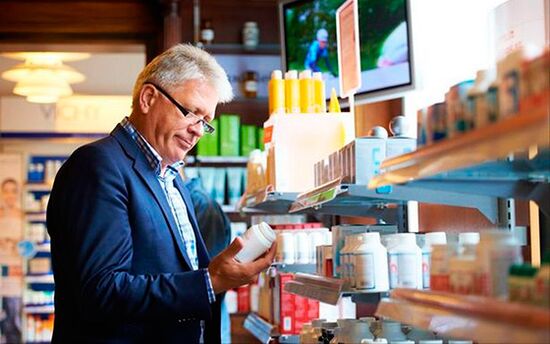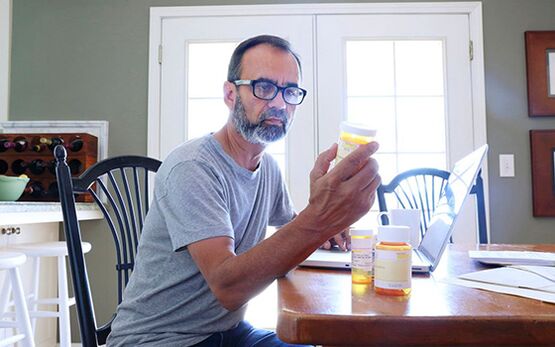Treatment of advanced prostatitis - both chronic and acute - is a comprehensive event that requires parallel use of a number of different medicines.Any specific case individually forms the necessary list of medication, depending on the patient's history, the course of the disease and a number of other important factors.

The types of drugs
The selection of free but effective drugs for prostatitis is based on understanding the causes of the disease and the features of its manifestation, however, antibiotics and anti -inflammatory drugs should be considered the main aspects of each drug list.Moreover, if the latter can be of a general nature, then it is advisable to prescribe antibiotic therapy, taking into account the objection of a specific type of pathogen identified as a result of the tests.
Moreover, such anti-prostate medicines as different types of anti-presidents, sedatives, diuretics, alpha-blockers, antispasmodics, antiandrogen and laxatives can be used in therapy.
You can classify modern medicines not only for its intended purpose but also in the form of release:
- Injection (injections): Treatment of inflammation of the prostate gland with injections is justified, first of all, in the case of a serious condition of a patient seeking immediate stabilization.As a rule, the medicines centered on ampoules are diluted until the solution is taken, after which it is prescribed to intramuscular or R intravenous infusion;
- Candles: Candle -shaped medicines are important during the planned chronic prostate therapy or as prostate prevention medicines.In some cases, suppositories are prescribed to increase the power, as the absorption of the intestinal mucosa substance ensures its best penetration into the prostate tissue;
- Tablets and capsules: These medicines are the most common in the standard treatment scheme for chronic or acute prostatitis.The tablets are easy to dose and get easily, therefore, most antibiotics, anti-inflammatory and legal remedies (alpha-blocking or 5-alpha reductase inhibitors) are produced in this form;
- Institution: This is not so often practiced with the prostate, the essence of which is the introduction of a medicinal solution into the urethra or bladder using a special syringe.The main purpose of insertion is to restore damaged mucosa, destruction of pathogenic microflora and suppressing inflammatory processes;
- Microclies: Small colds reduce local edema, inflammation and pain in the prostate gland, though at the same time they exacerbate drug transport in its tissues.In the last stages of therapy and after recovery, microcrylicism courses with solutions based on herbal medicines can be taken.With a long retention of fluid in the intestine, its mucosa absorbs useful substances;
- Plaster: Plaster costs, like microclies, belong to auxiliary measures in treating a prostate, and have a supporting effect on the body, complementing complete drug therapy.

When choosing the dose form of the medicine, it is also necessary to consider, in addition to the condition of the patient, his preferences.Some patients suffer problems with swallowing tablets, while others are contraindicated to others due to the presence of inflammatory diseases in the anorectal region.A significant role is also played by factors such as the availability and cost of the medication-it is always possible to choose a high and cheap cure for the prostatitis, which is why you need to get less effective analogs.
Antibiotics
The selection of antibiotics requires a selective approach, as it is important to choose a drug that suppresses a specific type (or species) of pathogens of inflammatory prostatitis.Why doctors study strokes taken from urethra, urine tests and prostate secretion samples.
Extremely is extremely desirable to use antibacterial antibiotics that have both bacteriostatic and bactericidal effects, so that the drug not only blocks the spread of infection but also actively destroying dangerous microorganisms.
Beta-lactam antibiotics, such as aminoglycosides, are preferred to a lesser extent, although they are free.Unlike fluoroquinolons and macrolides, they are characterized by a poor ability to penetrate the tissues of the prostate gland and create the necessary concentrations of the active substance in it.Forchinolones are powerful bactericidal preparations that are significantly superior in this parameter, stopping the spread of microorganisms, medicines
alpha-blocker
This set of funds is actively used not only for prostate but also for prostate adenoma, and their effectiveness is based on blockage of alpha-adrenergic receptors in order to prevent their contact with norepinephrine and adrenromatics.As a result, ship receptors do not receive vasoconstrictive nerve signals, which extends their expansion with subsequent improvement of blood circulation ..
It should be noted that in urology, the alpha1-selective blockers are actively used, affecting the receptors in the bladder, prostate and urinary tissue.
A decrease in tissue swelling not only improves the removal of toxins and liquid waste, but also tones of the entire men's genital system, helping to get rid of powerlessness and reduce a lift.
Anti -inflammatory drugs

Prostatitis in men is treated with the use of non -steroidal anti -inflammatory drugs (NSAIDs/NSAIDs) that meet the requirements of efficiency but at the same time safe for the body.The task of these medicines is to suppress the inflammatory process, which affected the prostate and, perhaps, the seed bubbles, the bladder neck and the distal urinary tract.
After a decrease in the clinical severity of prostate inflammation, the patient's condition is observed, including a decrease in body temperature, a decrease in swelling of the prostate gland, eliminating uric prevention and pain in the genital region.
Hormone
The use of hormonal drugs in the treatment of prostatitis is allowed only in the case of a chronic course of neglected disease, in which antibiotics, alpha blockers and anti-inflammatory drugs are unable to normalize the disturbed background of hormones.
Depending on the purposes, the patient can describe both androgens that increase the level of male hormones (testosterone) in the blood and estrogens that suppress the production of dihydrotestosterone, which provokes the growth of prostate tissue.
All of these medicines are strictly released according to the recipe, and should be used exclusively by the recipe of the attending physician, as incorrect or premature dose can destroy the patient's health.
Immunomodulators
The complicated course of acute prostatitis has exacerbated the development of immunosuppression, which can increase under the influence of a number of antibiotics and other medicines.For this reason, there is a need to strengthen the body's resistance (resistance) in relation to the pathogenic microflora, which is performed using immunostimulants.
Remember that vitamins A, C and E also contribute to strengthening immunity, so experts recommend actively consuming products that contain these substances in large quantities.
Analgesic
Anesthetic drugs, as a rule, are needed in the early stages of therapy, when treatment has not yet been able to function functionally the condition of the prostate, which is why the patient experiences pain during urination, defecation, long sitting on a difficult surface or physical activity.
As a rule, there are plenty of middle force analgesics accepted according to requirements from one to three times a day.Listed funds have many structural analogs (generations), and they are manufactured by many Russian and foreign companies, but doctors advise preference for local analgesics in order not to pay for the brand.
Musorexant
From the class of muscle relaxants in urology, it is common to prescribe antispasmodics - medicines that help to relax polished muscles in a state of spasms.Such therapy is effective in the acute flow of prostate, causing an involuntary spasm of the prostate muscle and the entire pelvic floor.

The use of the antispasmodic course is unnecessary: it is enough to take them in moderate doses during the first days or the week of general therapy.Also, these medicines cannot be abused to avoid the risk of damaged function of the organs and relevant body systems.
vegetable
Plant medicines prescribed for prostatitis are most often dietary supplements produced in the form of rectum suppositories, capsules or tablets.Among the well -known extracts that form the basis of such medicines - the cortex of African plum, the fruits of the crawl palm (or dwarf).A little less often an extract from the animal prostate gland (livestock) is used.There is also such a set of medicines as homeopathic preparations for the treatment of prostate inflammation.
To prevent prostatitis
Prostate prevention requires, first of all, to lead a healthy lifestyle, including regular sexual activity.But to maintain tone, different medicines can be used - as a rule, we are talking about biologically active additives of plant origin.Since manufacturers of these dietary supplements have stated their ability to help weaken sexual desire, impotence, erectile dysfunction and other disorders in the work of the male genitourinary system, they must be carefully careful as preventive agents for prostate.




































